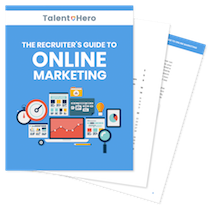When we checked our Google Search Console data, we saw a variation of one question come up again and again – “How do I start a recruiting agency?”
To answer this question, we reached out to the top experts in the world of recruiting and asked them the following:
What is the most important single piece of advice you would give to someone starting their own recruiting agency?
16 amazing people responded and provided their tips for launching your recruiting firm. Thank you to each one of them!
Andy Miller

Accept that you will need to be in a perpetual state of business development in order to sustain yourself.
Website: BrainWorks
Twitter: @BrainWorks
Chris Russell

Anyone starting an agency today should think about how to use branding as a marketing tool. Brand yourself as the go-to recruiter for whatever niche/industry you are targeting. Become a resource for people working in that space. If you do that, the candidates will come to you.
Website: RecTech Media
Twitter: @ChrisRussell
Gerry Crispin

Join professional and trade associations related to hiring and devote at least 5% of your time and a bit of your treasure to learn and become involved. It will put you in touch with communities who care about policies and people who want to contribute to the success of everyone in the industry.
Website: Career Xroads
Twitter: @GerryCrispin
Greg Savage

Don’t just “work hard” (although you will). Set meaningful, achievable and strategically-designed short term goals.
“In six months, we will hire two people, one to focus on permanent recruitment in accounting and one to generate business support revenue”. Then, once achieved, set a new goal. “In six months, we will be generating $30K per month in perm accounting and will add a temp/contract recruiter”. Then, “By December 31, we will hire an internal marketing resource and have an integrated digital marketing and social selling strategy in place and operating three months later”.
These are just examples but they make my point. So many start ups work hard and celebrate early success as if they have achieved something solid but it’s all frenetic activity and no planning or evaluation of whether they are actually going forward. Inevitably, they hit a “ceiling” that they can never break through because they are hamsters on a wheel, going nowhere.
Bite size, strategic imperatives that you tick off as you go will give you real and sustainable growth, protect against downturn, maximize profit in the good times and create an asset out of a business that would otherwise just be a job. Assuming you set the right strategy each time, of course.
Website: The Savage Truth
Twitter: @greg_savage
Jim Stroud

Research government data and focus your firm on where the need is greatest. The Occupational Outlook Handbook tracks labor trends and projects growth for various industries. Find a niche to exploit and the companies operating therein. Then, monitor hiring activity and network your way in. As you gear up to brand yourself as THE agency for whatever niche, make money in the meantime by focusing on companies struggling to hire masses of people now.
Website: Jim Stroud
Twitter: @jimstroud
Joe Burridge

I have never started my own agency but I have been in-house for almost five years and used a wide range of agencies in that time. Very often, it’s the small agencies that provide the most value and I believe that’s because they truly prioritise the roles we partner on. My advice for those looking to start their own agency is that when you bring on your first clients, stand out by making a true effort to understand that company inside and out. Be the one who makes onsite visits, provides market data and sends thorough candidate notes.
Website: Joe Blogs
Twitter: @JoeFindsTalent
Katrina Collier

Invest in your future success and read these these books – The Robot-Proof Recruiter by Katrina Collier and Full Stack Recruiter by Jan Tegze. Combined, they give you the skills, both human and technical, you need to succeed as a recruiter in 2019 and beyond.
Website: The Searchologist
Twitter: @katrinamcollier
Lou Adler

- Differentiate your process.
- Offer an extended guarantee.
- Target a niche specialty and know everyone.
- Ask the hiring manager the following question – “What does the person need to do to be considered extremely successful” rather than “What skills does the person need to have?”
Website: The Adler Group
Twitter: @LouA
The Recruiting Animal

If you are working a niche, it’s good to know a fair bit about the jobs you are recruiting for so you don’t have to ask basic questions of the hiring manager during the intake session and you have the knowledge that enables you to identify reasonable candidates and carry on good conversations when you speak to them.
On the other hand, a recruiter should always be bold and shame-free so that she can ask for searches on jobs she has never worked before and speak to candidates when she knows very little about what they do until they, themselves, tell her.
These tips are always relevant in recruiting but if you are working on your own and can’t count on anyone else to bring in orders or source candidates, you require knowledge and/or courage to reduce any inhibitions you might have about making cold calls.
Website: Recruiting Animal
Twitter: @animal
Rob Federico

Have enough money in savings to cover 6-12 months worth of your bills and grind as hard as you can every day.
Gareth Callaway

Get clients. Any fool can find candidates.
Website: Gateway Staffing
Sarah Keen

Proofread your email templates and online content over and over. Get others to read them. Keep refining them. Your excitement and determination can lead to rushing these essential elements and harming your relationships.
You can accept/reject a resumé after 3 seconds of reading it…. the shoe is on the other foot now. Your prospects will read your message and accept/reject YOU in three seconds.
Lisa Rokusek

Scale up on your resilience training. Getting comfortable with uncertainty is always a good skill.
Website: ARG
Darryl Dioso

Prospect non stop to fill both your client and candidate pipeline (and have a well stocked wine/liquor candidate handy).
Website: HR4U
Stef Nolan

Contact EVERYONE you have met “along the way”. You never know who is a hiring manager/decision maker now.
Christine Pellegrino Nichlos

It’s always about you. What you think, how you feel and what you do. Not that your team doesn’t matter, but the company will always follow its leader. If you are not a leader, hire one and just invest.
Website: People Science

